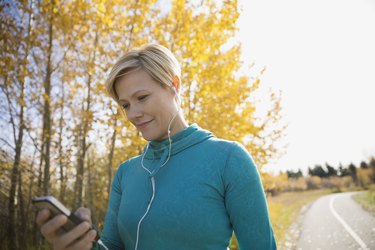
Anyone who's ever sniffled through a sweat session can tell you: Working out with seasonal allergies sucks. From a stuffy nose to watery eyes, these irritating symptoms can make your workouts infinitely more miserable, especially if you exercise outdoors. But don't let pesky pollen, ragweed and grass derail your fitness goals.
Here, Purvi Parikh, MD, an adult and pediatric allergist and immunologist with the Allergy & Asthma Network, offers tips that can make working out with allergies more bearable.
Video of the Day
Video of the Day
First Things First, Cold or Allergy?
Caused by viruses, colds are quite different from allergies, which result from your body's immune response to something in your environment. But with so many similar symptoms — runny nose, stuffiness, sneezing — how can you tell the difference?
If you experience aches and pains or a fever, you're likely dealing with a crappy cold (or perhaps even the flu). But if you tend to develop a "cold" around the same time each year or it lingers for weeks on end and/or is accompanied with itchy, watery eyes, odds are you have seasonal allergies.
To know for sure, visit an allergist who can help you pin down what's setting off your sniffles. Once you know what triggers your allergies, you can take proper precautions to reduce your exposure to allergens and minimize your symptoms.
Read more: 6 Tips for Dealing With Seasonal Allergies
1. Plan Ahead
Headed out for an early run? Not so fast. As a general rule, "avoid peak pollen times such as early morning if you are susceptible to pollen allergies," says Dr. Parikh.
Before you step outdoors, you should also check your local pollen and pollutant counts on websites like AAAAI.org (for the American Academy of Allergy, Asthma & Immunology) or Pollen.com. If pollen counts are off the charts, consider moving your workout indoors.
2. Try an Over-The-Counter Remedy
There's nothing more distracting than itchy eyes and a runny nose when you're trying to work out. Don't wait until your symptoms flare to start taking allergy medications.
Over-the-counter antihistamines like Claritin, Zyrtec and Allegra can make all the difference. Just avoid ones with sedatives like Benadryl that make you drowsy and can be potentially dangerous. You don't want to lose steam mid-breaststroke or feel sleepy while bench pressing a heavy weight.
3. Pollen-Proof Your Workout Clothes
Though you can't avoid all outdoor allergens, what you wear to work out can reduce your contact with them. Rocking a large pair of shades can help protect your peepers from all the irritants in the air that cause your eyes to itch, water and turn red. While you're at it, toss on a hat, too. Covering your head will keep pollen from sticking to your hair.
As soon as you finish your workout, toss your clothes (and your hat) into the wash and hop in the shower to rinse any airborne allergens from your body. The last thing you need is to drag that pesky pollen into your bed. Speaking of, make sure you clean your sheets often, a simple natural remedy for allergies. This way you can sleep soundly knowing your bed is allergen-free.
4. Choose the Right Exercise
Pushing though a HIIT routine or a kickboxing class may kick your allergy symptoms into high gear. Why? "Cardio and high impact movements can temporarily increase inflammation and blood flow, which can exacerbate your allergies," says Parikh. And if you have asthma, it's a double whammy.
Deep breathing from the abdomen can help, but it's essential to be on the correct asthma and allergy medications to avoid aggravating your symptoms, according to Dr. Parikh.
Rule of thumb? When your allergies are running rampant, stick to a low-key workout. Low-impact exercises like yoga may be your best bet.
5. Listen to Your Body
If you're taking all the proper precautions to combat your allergies and you still feel wiped during your workout, take a break. Sometimes your body just needs time to rest and recover. A good night's sleep may be just what you need to hit the pavement tomorrow.
Is this an emergency? If you are experiencing serious medical symptoms, please see the National Library of Medicine’s list of signs you need emergency medical attention or call 911.